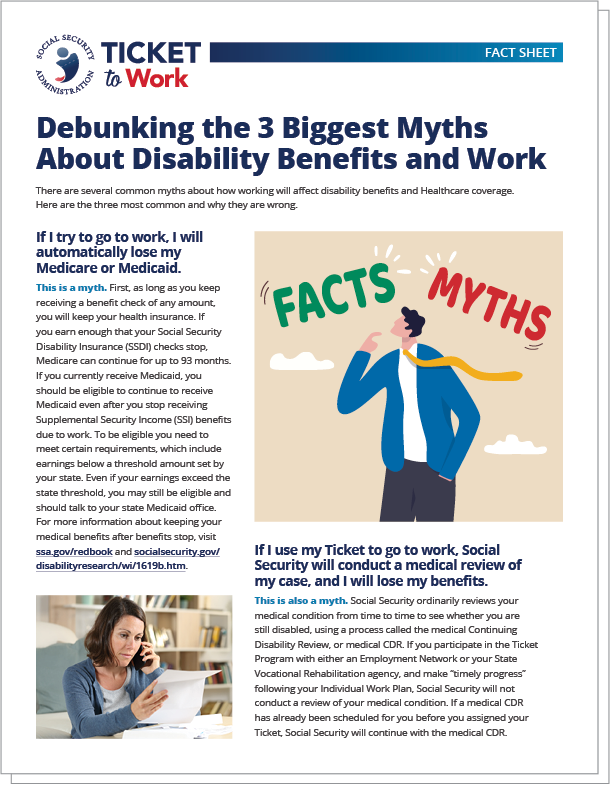Social Security makes every effort to ensure that any information published is accurate and up to date, but some information on this webpage may be historical.
What is Social Security's Ticket to Work Program?
 There are several common myths about how working will affect disability benefits and Healthcare coverage. Here are the three most common and why they are wrong.
There are several common myths about how working will affect disability benefits and Healthcare coverage. Here are the three most common and why they are wrong.
If I try to go to work, I will automatically lose my Medicare or Medicaid.
This is a myth. First, as long as you keep receiving a benefit check of any amount, you will keep your health insurance. If you earn enough that your Social Security Disability Insurance (SSDI) checks stop, Medicare can continue for up to 93 months. If you currently receive Medicaid, you should be eligible to continue to receive Medicaid even after you stop receiving Supplemental Security Income (SSI) benefits due to work. To be eligible you need to meet certain requirements, which include earnings below a threshold amount set by your state. Even if your earnings exceed the state threshold, you may still be eligible and should talk to your state Medicaid office. For more information about keeping your medical benefits after benefits stop, visit ssa.gov/redbook and socialsecurity.gov/disabilityresearch/wi/1619b.htm
If I use my Ticket to go to work, Social Security will conduct a medical review of my case, and I will lose my benefits.
This is also a myth. Social Security ordinarily reviews your medical condition from time to time to see whether you are still disabled, using a process called the medical Continuing Disability Review, or medical CDR. If you participate in the Ticket Program with either an Employment Network or your State Vocational Rehabilitation agency, and make “timely progress” following your Individual Work Plan, Social Security will not conduct a review of your medical condition. If a medical CDR has already been scheduled for you before you assigned your Ticket, Social Security will continue with the medical CDR.
If my checks stop because I go to work and then I have to stop working because of my disability, I will have to reapply for benefits all over again. It took me forever to be approved for benefits and I cannot afford to wait that long again. As a result, I should not try to work.
Again, it’s a myth. You will not need to reapply if your benefits ended within the past five years due to your earnings and you meet a few other requirements, including that you still have the original medical condition or one related to it that prevents you from working. This is a Work Incentive called Expedited Reinstatement. You may even be able to receive up to six months of temporary benefits in addition to Medicare or Medicaid coverage while SSA conducts a medical review to determine if your benefits can be reinstated.
For more information about Expedited Reinstatement, visit socialsecurity.gov/disabilityresearch/wi/exr.htm
Expedited Reinstatement
Expedited Reinstatement (EXR) acts as a safety net for people who successfully return to work and are no longer entitled to benefits.
If you need to stop working because of a medical impairment that’s the same as or related to your original disabling impairment within 5 years of when your benefits stopped, EXR may make it possible for you to have your benefits start again without needing to submit a new application.
Learn More
To learn more about the Ticket Program, call the Ticket to Work Help Line at 1-866-968-7842 or 1-866-833-2967 (TTY) Monday through Friday, 8 a.m. to 8 p.m. ET. Ask a representative to send you a list of service providers or find providers on your own with the Ticket Program Find Help tool.
Learn More
To learn more about the Ticket Program, call the Ticket to Work Help Line at 1-866-968-7842 or 1-866-833-2967 (TTY) Monday through Friday, 8 a.m. to 8 p.m. ET. Ask a representative to send you a list of service providers or find providers on your own with the Ticket Program Find Help tool.